MAX ROACH & ABBEY LINCOLN / “Triptych: Prayer / Protest / Peace”
When everything is finished in a world, the people go to look for what the artists leave. It's the only thing that we have really in this world -- is an ability to express ourselves and say, "I was here." —Abbey LincolnThis is the kind of music that can scare you into a new life. In terms of messing with your head, “Triptych” in particular is more potent that three tabs of uncut LSD. But let me back up to the late Fifties. Back to went sit-ins and Freedom Rides were forcing America to live up to the credos of democracy rather than persisting in ipso facto apartheid. What did it take to face down a snarling police dog, a fire hose, a three hundred pound redneck deputy swinging an oak billy club, the Klan bombings and shootings? What it took to go toe-to-toe with that required a bravery that was way beyond the norm. Where did that strength come from? The music knew. Jazz musicians in particular were at the forefront of trumpeting this fierce freedom declaration. They knew that bravery was our birthright. Even though many of us have never investigated this revolutionary music in any depth and most of never even heard of it, let alone actually listened to it, this is the music of our lives, our daily lives over a 400-year history. Hopefully this week's BoL can aurally illuminate this wonderous sound of freedom.
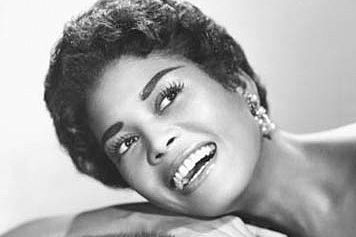 Anna Marie Wooldridge was born in Chicago on August 6, 1930. She grew up in rural Michigan. Started playing the piano as a precocious five year old. Eventually decided to pursue music and moved to Los Angeles where she met Bob Russell who eventually became her manager and was responsible for giving her the stage name of Abbey Lincoln. Actually Abbey was her second stage name. The first one had been Gaby Lee.
Anna Marie Wooldridge was born in Chicago on August 6, 1930. She grew up in rural Michigan. Started playing the piano as a precocious five year old. Eventually decided to pursue music and moved to Los Angeles where she met Bob Russell who eventually became her manager and was responsible for giving her the stage name of Abbey Lincoln. Actually Abbey was her second stage name. The first one had been Gaby Lee.
"I'm Aminata Moseka. I got a bunch of names. Anna Marie Wooldridge was the name I was born with. Then I took Gaby because the people at the Moulin Rouge in Los Angeles wanted me to have a French name. They didn't know I already had one. I didn't either. Anna Marie is as French as it gets. And Wooldridge is English. They gave me Gaby and kept Wooldridge so I had a German and an English name. It's America! [laughs] And then Bob Russell named me Abbey Lincoln, because we used to sit and talk about life. He understood how I felt about my people because he felt the same way about his. He said to me, "Well, since Abraham Lincoln didn't free the slaves, maybe you could handle it." Named me Abbey Lincoln and I laughed, but that's the name that I took. Abbey for Westminster Abbey he told me, and Lincoln for Abraham Lincoln. He was aware of his self and of his people—socially aware. He's the first socially aware person that I met. Bob Russell. Roach is socially aware. Duke Ellington, all of the great ones." —Abbey Lincoln interview by Lara PellegrinelliIn her early twenties, Abbey hit the jackpot. Big time! She was on the cover of Ebony magazine. It was the Fifties. Marilyn Monroe was the hottest star in Hollywood. Abbey had a figure to match Monroe’s, curve for curve and then some. Abbey had a cameo in the 1956 Jayne Mansfield movie The Girl Can't Help It for which Abbey wore the flaming red Monroe dress. Abbey’s performance in the independent 1964 film Nothing But A Man was widely acclaimed. She followed up with top billing in 1968's For Love of Ivy opposite Sidney Portier, the most famous and influential Black actor of his era. The rest would have been history had not Ms. Lincoln decided stardom as a sexy siren was not her calling. Ms. Lincoln decided to respond to the freedom movement. In the Sixties, she opted out of the sex kitten/vixen role. She was among the first to wear her hair natural and probably the only person to consciously abandon a lucrative career in the entertainment industry. "I was innocent and inexperienced, and in Hollywood there were people who were interested in selling me," Abbey Lincoln told Jill Nelson for an April 1992 article in Essence magazine. "People make you over, the give you other songs to sing, you wear the clothes they choose, they find you a personality they think will sell. It's all about prostitution, when you come down to it."
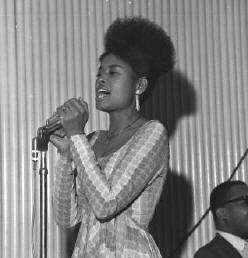 Abbey credits Max Roach as the person who introduced her to new ideas, new people, new experiences, all of which had a strong political bent.
In an interview conducted in the 1970s in Los Angeles, Abbey told Gallery 41, “I was in New York, miserable because I was working supper clubs but I wasn’t expressing myself. I was really unhappy with my life. I saw [Max] again and he told me I didn’t have to do things like that. He made me an honest woman on the stage. I have been performing in that tradition since. I feel that I’m a serious performer now whereas then I wanted to be but I didn’t know how.”
By the early Sixties, Max and Abbey married and toured extensively. Even though their ten-year marriage did not last—Max never again worked in tandem on a long term basis with a vocalist, nevertheless Lincoln’s commitment to producing meaningful music has persisted throughout her fifty-plus year career.
Abbey credits Max Roach as the person who introduced her to new ideas, new people, new experiences, all of which had a strong political bent.
In an interview conducted in the 1970s in Los Angeles, Abbey told Gallery 41, “I was in New York, miserable because I was working supper clubs but I wasn’t expressing myself. I was really unhappy with my life. I saw [Max] again and he told me I didn’t have to do things like that. He made me an honest woman on the stage. I have been performing in that tradition since. I feel that I’m a serious performer now whereas then I wanted to be but I didn’t know how.”
By the early Sixties, Max and Abbey married and toured extensively. Even though their ten-year marriage did not last—Max never again worked in tandem on a long term basis with a vocalist, nevertheless Lincoln’s commitment to producing meaningful music has persisted throughout her fifty-plus year career.
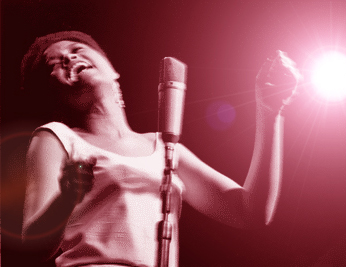 I saw Ms. Lincoln a number of times over the years. The first was at the 1968 Dillard University Black Arts Festival in New Orleans. Max’s band was a piano-less, sax-trumpet-bass-drums quartet plus Abbey Lincoln on vocals. The band challenged every preconception I had about how much music four instruments and a voice could make. It was akin to a heart transplant. When they finished, I was not the same. I had new ideas swirling in my head. I stood taller, my stride was more deliberate. I believed I could do and be anything, and more importantly I could now truly imagine a brave new Black world. I was ready to do battle, emboldened. The air tasted fresher. Everyone who was there in that gymnasium that night was thoroughly moved—you should have heard the thunder of the ovations that Max, Abbey and the other musicians received. We clapped so loudly and so strongly you not only heard us, you literally felt the physically vibrant force of our applause.
Particularly when Max and Abbey did the tour-de-force “Tryptich,” (from We Insist) I just stood next to the stage, holding my camera in my hand but not raising it to shoot. I was mesmerized. Abbey Lincoln was riveting. I was stunned. I literally just stood there. I’m sure my mouth was hanging agape.
I knew about vocalese, the fitting of lyrics to famous jazz solos, but “Tryptich” was several levels beyond because there are literally no words in English to describe specific aspects of our historic and contemporary experiences. Abbey and Max made me believe in time travel, believe in the power of a secular Holy Ghost, a terrible Shiva-force that destroyed you to renew you. I was afraid for her—and for myself also. It seemed as though she might hurt herself. It seemed as if I should do something helpful and not just be a stationary stump while she was going through this. This was not just jazz. This was a religious experience. A new way to live.
Whether wordlessly emoting or crafting incredibly moving readings of standards, Abbey Lincoln had a way with sounds and words that went far beyond what the majority of singers were doing. This was not birds and bees. This was Sankofa, Signifying Monkeys, and a Brer Rabbit band of underground guerillas. My Lord, what a music!
I saw Ms. Lincoln a number of times over the years. The first was at the 1968 Dillard University Black Arts Festival in New Orleans. Max’s band was a piano-less, sax-trumpet-bass-drums quartet plus Abbey Lincoln on vocals. The band challenged every preconception I had about how much music four instruments and a voice could make. It was akin to a heart transplant. When they finished, I was not the same. I had new ideas swirling in my head. I stood taller, my stride was more deliberate. I believed I could do and be anything, and more importantly I could now truly imagine a brave new Black world. I was ready to do battle, emboldened. The air tasted fresher. Everyone who was there in that gymnasium that night was thoroughly moved—you should have heard the thunder of the ovations that Max, Abbey and the other musicians received. We clapped so loudly and so strongly you not only heard us, you literally felt the physically vibrant force of our applause.
Particularly when Max and Abbey did the tour-de-force “Tryptich,” (from We Insist) I just stood next to the stage, holding my camera in my hand but not raising it to shoot. I was mesmerized. Abbey Lincoln was riveting. I was stunned. I literally just stood there. I’m sure my mouth was hanging agape.
I knew about vocalese, the fitting of lyrics to famous jazz solos, but “Tryptich” was several levels beyond because there are literally no words in English to describe specific aspects of our historic and contemporary experiences. Abbey and Max made me believe in time travel, believe in the power of a secular Holy Ghost, a terrible Shiva-force that destroyed you to renew you. I was afraid for her—and for myself also. It seemed as though she might hurt herself. It seemed as if I should do something helpful and not just be a stationary stump while she was going through this. This was not just jazz. This was a religious experience. A new way to live.
Whether wordlessly emoting or crafting incredibly moving readings of standards, Abbey Lincoln had a way with sounds and words that went far beyond what the majority of singers were doing. This was not birds and bees. This was Sankofa, Signifying Monkeys, and a Brer Rabbit band of underground guerillas. My Lord, what a music!
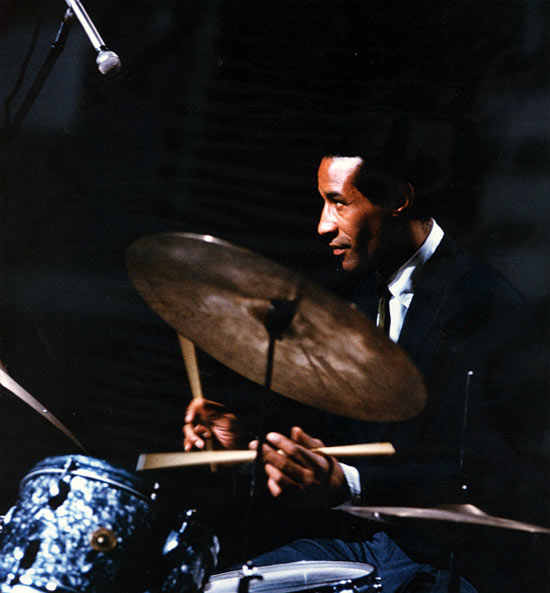 Max Roach’s “Lonesome Lover” was used as the closing theme song for Larry McKinley’s Saturday afternoon This Is Jazz program on WYLD, at the time the leading Black radio station in New Orleans. Max mixed the political force of jazz with the spiritual force of gospel, producing a music you immediately recognized and related to but nevertheless a music you had never experienced before, a music that helped transform you into a you that had never existed before.
Max Roach was an awe-inspiring innovator and Abbey Lincoln in all her beauty was right there giving fierce feminine voice to the freedom we all yearned for. Just the title, “Lonesome Lover,” was a commentary befitting times when beatings, jail and sometimes death was a common response to expressions of opposition to the palpable oppression and seemingly endless exploitation of status quo segregation. We were certainly in love with ourselves and each other but we were often also isolated as any vanguard is; self-proclaimed “Blacks” struggling to swim within a sea of Negroes, struggling not just to survive but struggling also to transform the sea itself into a mighty social force, a Black tide rising. Max and Abbey were producing a soundtrack for revolution. “Lonesome Lover” was a cut from an album whose title confronted you if you were inactive, urged you on it you were in motion. The album was simply called It’s Time.
Max Roach’s “Lonesome Lover” was used as the closing theme song for Larry McKinley’s Saturday afternoon This Is Jazz program on WYLD, at the time the leading Black radio station in New Orleans. Max mixed the political force of jazz with the spiritual force of gospel, producing a music you immediately recognized and related to but nevertheless a music you had never experienced before, a music that helped transform you into a you that had never existed before.
Max Roach was an awe-inspiring innovator and Abbey Lincoln in all her beauty was right there giving fierce feminine voice to the freedom we all yearned for. Just the title, “Lonesome Lover,” was a commentary befitting times when beatings, jail and sometimes death was a common response to expressions of opposition to the palpable oppression and seemingly endless exploitation of status quo segregation. We were certainly in love with ourselves and each other but we were often also isolated as any vanguard is; self-proclaimed “Blacks” struggling to swim within a sea of Negroes, struggling not just to survive but struggling also to transform the sea itself into a mighty social force, a Black tide rising. Max and Abbey were producing a soundtrack for revolution. “Lonesome Lover” was a cut from an album whose title confronted you if you were inactive, urged you on it you were in motion. The album was simply called It’s Time.
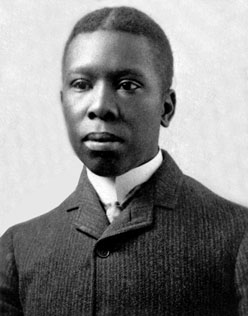 At the turn of the 20th century, Paul Laurence Dunbar was “the” Black poet of America. Vocalist/composer Oscar Brown Jr. put music to the Paul Laurence Dunbar poem "When Malindy Sings." Abbey Lincoln, who published essays championing Black power, embraced Dunbar’s dialect lyrics and gave a totally sincere and serious interpretation whose subtext is a philosophical championing of Black music. This is from Abbey's fourth solo album, which annouced her new found direction: Straight Ahead.
These are classic jazz recordings not usually taught in general college (not to mention high school) level music appreciation courses. But if the mainstream can keep reviving Showboat and other racist memorabilia of that ilk, we damn sure need to get on top of our own alternative creations. Consider this week on BoL a ladder to climb up to a higher level. Stand on the sound shoulders of 20th century revolutionary Black music.
—Kalamu ya Salaam
P.S. For $4.95, iTunes offers a download of the whole We Insist album. No excuses. Get it!
Definite classics
Man, it's hard to even know how to respond to all of this. I had no idea that Abbey could've been a movie star. I mean, I have eyes—I knew she was pretty enough; I just didn't know she'd gone in that direction. So mostly, I'm thankful for all of the background information on Abbey and I'm thankful for Kalamu's personal story about listening to Abbey and Max and their band tearing it up live.
Kalamu and I chose to make this a blog about Black music, but I listen to a lot of other music too. I'm bringing that up now because I never would've thought that a jazz band could produce the raw sound power of some of the alternative rock bands I like. The middle section of "Tryptich" sounds like.... It's hard to say what, but damn! You know? (Great cover photo too. All three cats looking so clean in their suits and ties, glancing back at the camera like, "What?")
I was already familiar with "Lonesome Lover" and "When Malindy Sings." Both are great records. Definite classics.
It's funny that I'm the one who actually kicked off this week on Abbey Lincoln. It's funny because I knew next to nothing about her. That's one of the advantages of having Kalamu as a father and as a writing partner. If I ever want to know something about a jazz or soul artist, I can just write a half-assed piece on them and he'll jump in and do the rest. (I'm sitting here already deciding on my next selection. Let's see: Dexter Gordon? Tania Maria? Choices, choices. We'll see....)
—Mtume ya Salaam
"Tryptich" Is A Duet!
Mtume, "Tryptich" is just two people, drummer Max Roach and vocalist Abbey Lincoln. There are no other instruments. And if "Tryptich" sounds "damn" on record, you shoulda oughta heard it live. The power of Black beings on fire!
By the way, sometimes we called this music Fire Music. I'm sure it is obvious why on an aesthetic level, but there is more. The conscious musicians wanted to do away with the stigma associated with the term jazz, just like we were beating Negro out of our mouths and consciousnesses.
As for the cover of We Insist, here's the deal: The record came out August 31, 1960. It dropped like a sneak nuclear attack.
February 1, 1960 four young men—Ezell Blair, Jr. (now Jibreel Khazan), David Richmond, Franklin McCain and Joseph McNeil—later known as the Greensboro Four—conducted the first sit-in at a Woolworth's lunch counter in Greensboro, North Carolina. Within a week, students were sitting-in at lunch counters in over 54 cities all up and down Dixieland. Most of us today have no idea how tumultuous those early days of the non-violent revolution were. Seven months after the first sit-in, Max and Abbey and a crew of coharts (including Nigerian drummer Olatunji) produced We Insist. This was the soundtrack of social upheaval. The cover commemorates the sit-in movement.
I know Kind Of Blue is the most popular jazz record of that era, but We Insist was by far the most socially conscious. Moreover, make no mistake, although Max Roach was clearly the leader, Abbey Lincoln was much, much more than simply wifey helpmate. She was a comrade and proud co-conspirator. Without Abbey's contribution, the session could not have been done. Unlike some other recordings, one can not think of even one other vocalist who could have substituted for her. As we write this history of Black music, we must always be cognizant of the seminal and sine qua non contributions of Black women, both on stage as artists and off-stage as supporters and behind the scenes operatives.
At the turn of the 20th century, Paul Laurence Dunbar was “the” Black poet of America. Vocalist/composer Oscar Brown Jr. put music to the Paul Laurence Dunbar poem "When Malindy Sings." Abbey Lincoln, who published essays championing Black power, embraced Dunbar’s dialect lyrics and gave a totally sincere and serious interpretation whose subtext is a philosophical championing of Black music. This is from Abbey's fourth solo album, which annouced her new found direction: Straight Ahead.
These are classic jazz recordings not usually taught in general college (not to mention high school) level music appreciation courses. But if the mainstream can keep reviving Showboat and other racist memorabilia of that ilk, we damn sure need to get on top of our own alternative creations. Consider this week on BoL a ladder to climb up to a higher level. Stand on the sound shoulders of 20th century revolutionary Black music.
—Kalamu ya Salaam
P.S. For $4.95, iTunes offers a download of the whole We Insist album. No excuses. Get it!
Definite classics
Man, it's hard to even know how to respond to all of this. I had no idea that Abbey could've been a movie star. I mean, I have eyes—I knew she was pretty enough; I just didn't know she'd gone in that direction. So mostly, I'm thankful for all of the background information on Abbey and I'm thankful for Kalamu's personal story about listening to Abbey and Max and their band tearing it up live.
Kalamu and I chose to make this a blog about Black music, but I listen to a lot of other music too. I'm bringing that up now because I never would've thought that a jazz band could produce the raw sound power of some of the alternative rock bands I like. The middle section of "Tryptich" sounds like.... It's hard to say what, but damn! You know? (Great cover photo too. All three cats looking so clean in their suits and ties, glancing back at the camera like, "What?")
I was already familiar with "Lonesome Lover" and "When Malindy Sings." Both are great records. Definite classics.
It's funny that I'm the one who actually kicked off this week on Abbey Lincoln. It's funny because I knew next to nothing about her. That's one of the advantages of having Kalamu as a father and as a writing partner. If I ever want to know something about a jazz or soul artist, I can just write a half-assed piece on them and he'll jump in and do the rest. (I'm sitting here already deciding on my next selection. Let's see: Dexter Gordon? Tania Maria? Choices, choices. We'll see....)
—Mtume ya Salaam
"Tryptich" Is A Duet!
Mtume, "Tryptich" is just two people, drummer Max Roach and vocalist Abbey Lincoln. There are no other instruments. And if "Tryptich" sounds "damn" on record, you shoulda oughta heard it live. The power of Black beings on fire!
By the way, sometimes we called this music Fire Music. I'm sure it is obvious why on an aesthetic level, but there is more. The conscious musicians wanted to do away with the stigma associated with the term jazz, just like we were beating Negro out of our mouths and consciousnesses.
As for the cover of We Insist, here's the deal: The record came out August 31, 1960. It dropped like a sneak nuclear attack.
February 1, 1960 four young men—Ezell Blair, Jr. (now Jibreel Khazan), David Richmond, Franklin McCain and Joseph McNeil—later known as the Greensboro Four—conducted the first sit-in at a Woolworth's lunch counter in Greensboro, North Carolina. Within a week, students were sitting-in at lunch counters in over 54 cities all up and down Dixieland. Most of us today have no idea how tumultuous those early days of the non-violent revolution were. Seven months after the first sit-in, Max and Abbey and a crew of coharts (including Nigerian drummer Olatunji) produced We Insist. This was the soundtrack of social upheaval. The cover commemorates the sit-in movement.
I know Kind Of Blue is the most popular jazz record of that era, but We Insist was by far the most socially conscious. Moreover, make no mistake, although Max Roach was clearly the leader, Abbey Lincoln was much, much more than simply wifey helpmate. She was a comrade and proud co-conspirator. Without Abbey's contribution, the session could not have been done. Unlike some other recordings, one can not think of even one other vocalist who could have substituted for her. As we write this history of Black music, we must always be cognizant of the seminal and sine qua non contributions of Black women, both on stage as artists and off-stage as supporters and behind the scenes operatives.
This entry was posted on Sunday, March 4th, 2007 at 1:01 am and is filed under Classic. You can follow any responses to this entry through the RSS 2.0 feed. You can leave a response, or trackback from your own site.
2 Responses to “MAX ROACH & ABBEY LINCOLN / “Triptych: Prayer / Protest / Peace””
March 4th, 2007 at 7:02 am
These overview musical selections (classic, contemporary, cover) of Abbey Lincoln and Max Roach are excellent from A to Z. Thanks ever so much for bringing them to us. Kalamu, your commentary on Ms. Lincoln is superb and sensitive, so much so Max Roach kinda got lost in the loop. What you all have been doing recently nevertheless is quite unique and important.
March 4th, 2007 at 10:42 am
I have been a fan of Abbey Lincoln’s singing/songs for a long time. Recently, I re-viewed ” Nothing But A Man” just to see her again in film. I always wondered why she “disappeared” for so long, and why she never acted again.
I adore her music and the political and truthful way in which she delivers it. Thanks for featuring her!!
Leave a Reply
| top |